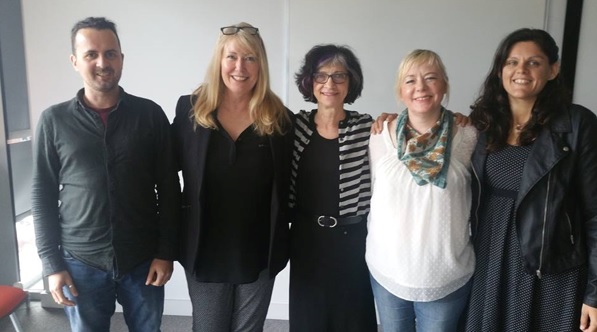Karynn Capilé (Brazil) reflects upon her time as a visiting PhD student at CfHAS
I’m a PhD student in Bioethics, Applied Ethics and Public Health (PPGBIOS) at Federal Fluminense University (UFF) of Rio de Janeiro, Brazil. I have an undergraduate degree in Philosophy as well as one in Veterinary Medicine and a Master’s degree in Veterinary Medicine. I’ve been focusing my studies on animal welfare, animal ethics and neighbouring fields. My current research is about cows in dairy products marketing. In a broader sense, I’m interested in understanding how popular media collaborate with societal views and attitudes toward non-human animals. I am also interested in the cognitive mechanism behind certain moral beliefs according to which exploiting animals remains justifiable even in the face of increasing scientific evidence supporting the discontinuation of animal use.
In Brazil, PhD students can apply for a “sandwich PhD scholarship” granted by CAPES – the main Brazilian academic funding agency – to study abroad for a period ranging from 4 to 12 months, with the purpose of improving the research and to foster cultural and academic exchange with other post-graduate programs. Last year, I made contact with Professor Claire Parkinson and asked her about the possibility of joining the CfHAS team for a period of four months. After reading my PhD proposal, Professor Parkinson and Dr Richard Twine agreed to supervise me. I then applied and fortunately was awarded the scholarship from CAPES to enrol in CfHAS from April to July of 2017. And then my extraordinary experience started. Everything was challenging and new, since the first e-mails I exchanged with Claire and Richard and the International Office team, to the moment I arrived at my accommodation at Edge Hill University.
Claire and Richard were always kind and supportive and also patient with my difficulty regarding the English language especially in our first meetings. They contributed a lot to the development of my thesis, suggested excellent readings and helped me to narrow down the subject (focusing on dairy products packages). They also helped me improve the methodology. I really learned a lot from the exchanges I had with Claire and Richard in our periodic meetings, and with Mariana Andrade, who presented me some basic concepts from marketing, whilst suggesting many readings, and with PhD students Andrea Wren and Abi Masefield with whom I had very interesting chats. I also had the opportunity to meet CfHAS Visiting Professor Jody Berland (from Canada) in my first week at Edge Hill. In June, I took part in the CfHAS Conference in Liverpool. It was a fantastic experience for me to meet and talk with so many brilliant people, to hear their considerations and share my doubts and concerns with them.
I came to know about CfHAS when reading Professor Parkinson’s book Popular Media and Animals on the occasion of writing my PhD proposal. That made me even more interested on this subject. Before contacting Claire, I was not aware of Dr Twine’s work and I became very impressed with so many interesting discussions and writings he was involved in. I was especially glad about his writing on Bioethics and his papers also helped me to improve my understanding of Critical Animal Studies, which is not a well-known area in Brazil. (The main studies, groups and programs focused on ethical and political aspects of human-animal relations are the bioethics and animal or environmental ethics centres and labs.)
Visiting CfHAS contributed a lot to my work, from improving my understanding of the English language to contacting authors and discussions I had no awareness of. I take this occasion to thank all the CfHAS team, as well as the other students, for providing me with the chance of learning and discussing issues of non-human animal conditions in our society. This experience was essential for developing my thesis because my academic background does not provide enough knowledge in media studies and I had to start from the beginning in many aspects.
Professor Claire Parkinson was particularly understanding of the gaps in my media knowledge and very perceptive noticing the aspects I was lacking. I’m sure this period was a landmark in my academic and personal development. Beside the CfHAS and the Edge Hill University staff, I’m also grateful to CAPES, to the PPGBIOS’ Coordination, to my supervisor in Brazil, Professor Rita Leal Paixão, and to everyone who supported me somehow and contributed to making this happen. I strongly encourage other students to visit CfHAS and I’ll be happy to provide more information that could help. Don’t hesitate to send an email to me at [email protected].
Also, I would like to leave an open pathway for everyone who is interested in being a visiting student in a Bioethics post-graduate program in Brazil, in any animal ethics studies centre, or even for people who are just interested in animal protection movements and veganism in Brazil.

